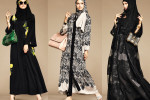As part of the True Life series, MTV recently aired an episode titled, “Resist the Power! Saudi Arabia,” in which the lives of several young Saudis were filmed. The show documents a handful of struggles experienced by Saudi Arabia’s large youth population. Among them, the show follows a young man named Ahmad in his fight to provide women a voice within Jeddah’s City Council and Fatima, a 20-year-old psychology student (pictured below), who is pioneering a colorful abaya line that will challenge the status quo of the all-black attire.
Fatima is pictured in brightly-colored hijabs and abayas juxtaposed against a sea of black abaya-donned women. She says that it is not uncommon for people to stare at her when she wears colored abayas. A male fabric storeowner tells her that a black abaya is what “shows the woman’s modesty.” She says wearing black abayas is the “practice of Islam in our culture, but that is not Islam at all.”
Later, they show Fatima with her mother and friend on a boat. As she looks at the men riding jet skis in circles around them, she says, “Here, women are precious, they are the jewels of the family, and there are a lot of things I would really want to experience but I can’t.” In a later scene, Fatima and a friend, dressed as boys to avoid being stopped by the religious police, go bike riding. She says, “A woman should do anything a man does…the journey to reach a goal as big as equality between genders is not an easy goal. I just want women to believe in themselves. It is our right to have a voice.”
Women are seen in the show saturating public spaces, going to the mall and restaurants, doing business and speaking with men regarding issues that matter the most to them.
Ahmad is also fighting for women’s rights as he accompanies women, among them Fatima, in their efforts to become more civically engaged. In a meeting among a handful of politically-active women in Jeddah, Muslim women voiced their concern that the women’s movement is hindered because women are not allowed to drive in Saudi Arabia. One woman says that people believe that women don’t have anything to contribute to society. Ahmad tells the viewers that these women are using their frustrations as a motivation for change.
The women go to the Chamber of Commerce to discuss women’s rights with Jeddah’s male city council members. Because this is the first time this has happened, the meeting has the men a little nervous as they debate whether to partition the room with a physical divide. The first woman speaks saying, “I suggest the council take initiative in accepting women as its members.” The women’s primary concern is not being able to drive and how this affects their ability to live their lives.
The meeting was a step toward woman’s rights in Jeddah–however, in the end of the show we learn that despite pressures, the city council decided to not meet with women anymore.
In this episode, viewers can see what are noted as cultural ills and not as religious problems. The youth pictured in this episode of True Life all practice their religion and do so without any indication that their religion must be reconciled with their seemingly “progressive” ideas. Rather, cultural norms seem to be the issue here.
While it is clear that Saudi women are in some cases prevented from doing certain things that are seen by the majority of people as basic freedoms, it is also clear that these women are not broken or demoralized. Fatima and the other women on the show—unlike the demure, silent Muslim women we often see depicted—are speaking up and fighting against gender inequality that prevents them from driving, riding bikes, and becoming civically engaged. They are using their voices and (as in the case of Fatima, who is creating a colored abaya line) these women are physically doing things to fight back and rebel.

